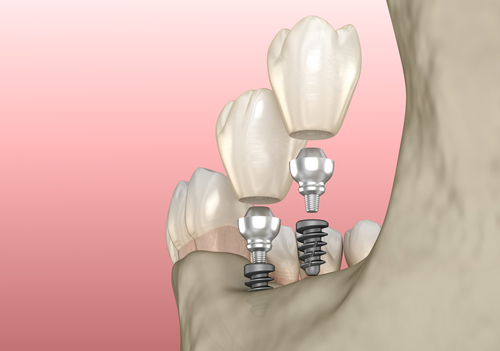Dental implants are a tooth replacement option that involves the surgical placement of small metal posts into the jawbone to support a natural-looking prosthetic. Their design mimics the look and function of natural teeth, providing patients with a fully restored beautiful smile. Dentists can use them to restore one or multiple missing teeth.
A dental implant is made of a biocompatible material, commonly titanium, allowing it to naturally fuse with the jawbone over time. This process, known as osseointegration, creates a strong foundation for the custom prosthetic.
At Desert Hills Dental Care, our Farmington dentist offers dental implant treatments. We’re here to help you meet your oral health goals and restore the function and beauty of your smile.
The Dental Implant Structure
A dental implant consists of the following three components:
- Implant Body: The main part of the implant that’s usually made of titanium or a titanium alloy. It’s surgically placed into the jawbone to serve as the foundation for the rest of the implant.
- Abutment: The part that protrudes above the gum line and provides a connection point for the prosthetic tooth. It’s typically made of titanium or a similar material.
- Artificial Tooth: The visible restoration that replaces the tooth. It’s most often a dental crown that can be made of porcelain, ceramic, or acrylic resin.

The Types of Dental Implants
Endosteal Dental Implants
The most common type of dental implant is endosteal. With endosteal dental implants, The post gets inserted directly into the jawbone and is used for patients who have enough bone structure to support it.
There are various dental implant treatments available today. However, each dental office offers different options. To learn more about the options offered at our Farmington practice, contact our dentist today.
Single-Tooth Dental Implants
Single-tooth dental implants completely replace one lost tooth from root to crown. It involves the placement of a titanium implant into the jawbone that serves as the foundation for a custom-made prosthetic tooth. In most cases, patients receive a dental crown as the visible portion of their implant treatment. Single-tooth dental implant treatment provides patients with a permanent solution for missing or damaged teeth.
All-On-4
All-on-4 dental implants are full-arch replacement options. It involves placing four dental implants in the jaw and securing a full arch of prosthetic teeth to them. The All-on-4 technique is less invasive and can be completed in one day. All-on-4 implants are a good option for those who have lower bone density, as it allows for the restoration of a full arch of teeth while using fewer implant posts.
Implant-Retained Bridges
Implant-retained bridges are excellent options for replacing multiple teeth. A dental bridge is anchored to the jaw using dental implants. The bridge is typically made up of two or more artificial teeth that get connected and attached to the implant abutments. The number of posts needed will vary depending on the size of the bridge.
Implant-Supported Dentures
Implant-supported dentures are removable appliances anchored to the jaw using dental implants. They provide a more secure fit and eliminate the need for any messy adhesives that traditional dentures typically need. Implant-supported dentures are also a more stable option than traditional dentures and can improve overall oral health by providing stimulation to the jaw bone.
Mini Dental Implants
Mini dental implants are a smaller version of traditional implants. They’re a less invasive implant option typically used to replace a single tooth or stabilize a loose denture. They shorten the healing process and have a lower cost. However, they may not be suitable for patients who don’t have adequate bone density.
Immediate-Load “Same Day” Dental Implants
Immediate-load dental implants, also known as same-day implants, are done in one appointment. With immediate-load implants, the implant and prosthetic tooth are placed at the same time, allowing the patient to leave the dental office with a fully functional replacement tooth after just one dental implant procedure.
Zygomatic Dental Implants
Zygomatic dental implants can restore lost teeth for patients who don’t have enough jawbone density to support a traditional endosteal implant. While zygomatic implants are still in use, they’re less common today and aren’t utilized by our Farmington dentists.
Subperiosteal Dental Implants
Subperiosteal dental implants sit on top of the jawbone but under the gum tissue. Subperiosteal implants are rarely ever used due to modern technological advancements in the field of implant dentistry.
What’s the Best Implant Treatment Option for You?
When determining the best dental implant treatment, you should consider your individual dental needs and smile goals. Factors such as the number of lost teeth, the condition of your jawbone, and your budget all play a role in determining the best option. When weighing your options, the dental implant benefits and costs should also be evaluated. Your dentist or oral surgeon can help you evaluate your options and make a recommendation.
If you’re wondering where to start, find out how to find the best dental implant provider for you and your needs. For those located in the Farmington area, contact our implant dentist today.
Frequently Asked Questions
Yes, a missing tooth needs to be replaced as soon as possible. By not replacing a lost tooth, you may experience:
- Shifting of the surrounding teeth: When a tooth is lost, the surrounding teeth may shift to fill the gap. Shifting teeth can lead to misalignment and bite problems.
- Bone loss: The jawbone needs stimulation from the roots of the teeth to maintain its density. When a tooth is missing, the jawbone may shrink, leading to bone loss.
- Increased risk of periodontal disease: Missing teeth can create space for bacteria to accumulate, increasing your risk of gum disease.
- Difficulty speaking and eating: Missing teeth can make it difficult to speak clearly and chew food properly.
Dental implants can be placed by a few different types of dental professionals, including:
- An Oral and Maxillofacial Surgeon: Dental professionals who have completed additional training and education in the surgical placement of dental implants. They have the most extensive training and experience in implant placement and are often considered the most qualified to place them.
- A Periodontist: A dentist who specializes in the treatment of periodontal disease and the placement of dental implants. They have completed additional training in implant placement and have a good understanding of the underlying bone and tissue structure.
- A Prosthodontist: A dentist who specializes in the replacement of missing teeth and the restoration of natural teeth. They’re also qualified to place dental implants.
- A General Dentist: General dentists have completed training in implant placement and are qualified to place them.
Certifications and qualifications vary based on the country, state, or region. Some states or countries may have different laws and regulations regarding who’s qualified to place dental implants.
On average, dental implants can last for between 20 years and a lifetime. To increase the longevity of your dental implant, maintain an excellent at-home oral hygiene routine and schedule regular dental visits for checkups and cleanings.
Yes, dental implants can replace several missing teeth. Between implant-supported bridges, All-on-4 dental implants, and implant-supported dentures, there are various options for patients missing multiple teeth. Consult with your dentist, and they’ll discuss the best option for your needs.
Learn More About Your Dental Implant Options
Ready to find out if dental implants are exactly what your smile needs? To learn more about your dental implant options, contact your local dentist today. If you happen to live in the Farmington, NM, area, contact our implant dentist today to schedule a consultation and see how we can improve your oral health with a customized treatment plan.
